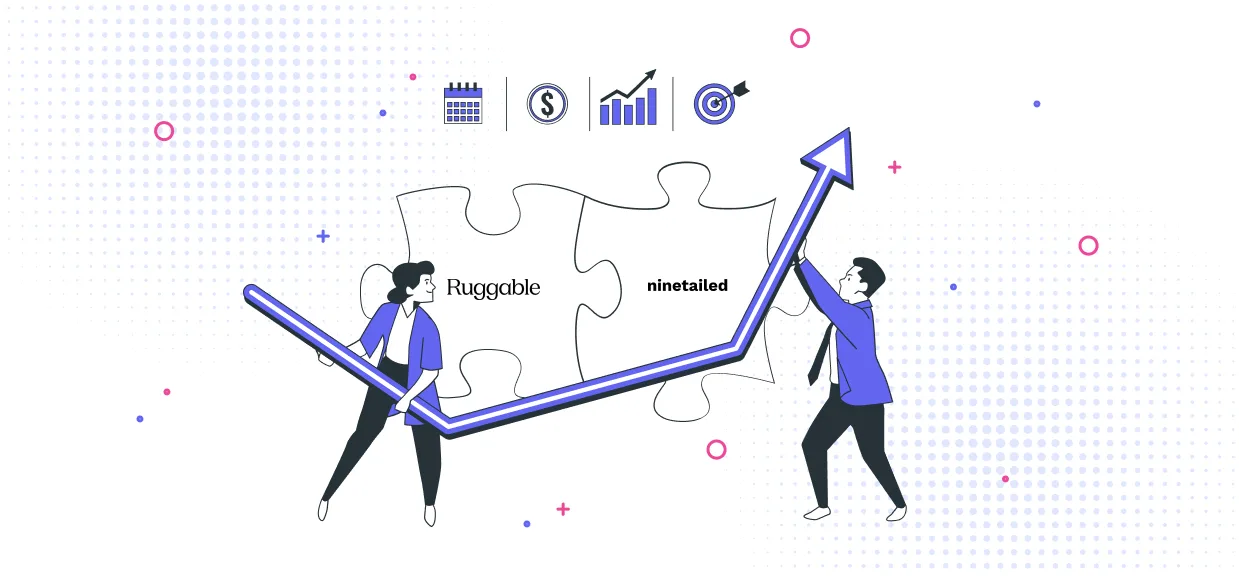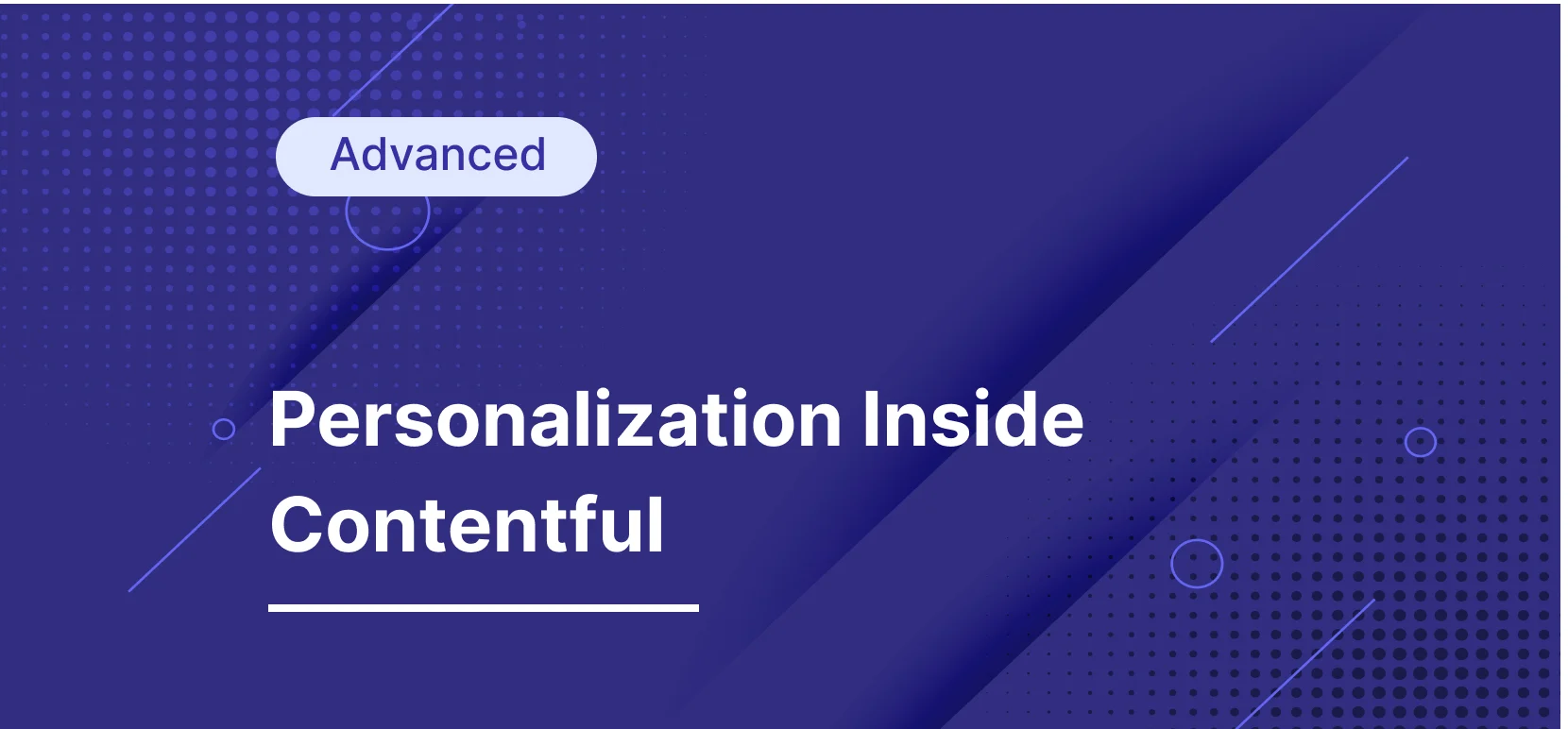- Personalization
Best Website Personalization Tools in 2024


According to Google, 90% of marketers believe personalization significantly contributes to an organization’s profitability.
That’s not a statistic to be ignored.
Customer experience personalization has become an essential part of modern marketing strategies, as tailored experiences have been proven to drive customer loyalty and revenue. While there was a time when personalization was extremely time-consuming and required significant involvement from developers, today’s modern website personalization tools make it easy for marketers and their teams to create personalized customer experiences.
We’ve rounded up some of the top website personalization tools available in 2024 and evaluated them based on their functionality and key features, main user audiences, and the top takeaways that make each tool unique.
Ninetailed
Best for: Empowering marketing teams to easily deliver personalization at scale and optimize user engagement strategies — without depending on developers. This is made possible through straightforward personalization, A/B testing, and AI-powered audience, experiment, and personalization suggestions.
Ninetailed is an AI-native personalization and experimentation platform designed to help organizations drive growth and revenue by using the knowledge of their customers to tailor their experience. Ninetailed enables users to create smart, personalized experiences within their content management system (CMS) without the need to pull in developers.
It has native AI-powered customer segmentation capabilities that allow you to build detailed customer profiles and segments. The platform also integrates with businesses’ data sources, like customer relationship management (CRM) systems and customer data platforms (CDP). These integrations allow users to take segmentation to the next level by developing comprehensive profiles based on real-time, real-life demographic, and behavioral data.
With Ninetailed personalization, companies can optimize their customers’ digital experiences and ensure they’re targeting the right customers, which boosts ROI. Many e-commerce companies use Ninetailed to create individualized shopping experiences, helping to increase conversion rates and average order value. After all, 91% of customers are more willing to spend with companies that offer relevant suggestions and products.
B2B SaaS companies use Ninetailed to enhance their web experiences and ensure they’re reaching the right businesses. By leveraging personalization, these companies craft tailored experiences for each visitor or account, resulting in higher engagement and more successful business interactions.
Once Ninetailed is installed and configured, there is no need to depend on developers to create personalized experiences or experiments. There is also no need to add, change, or remove code, as is required with platforms like Optimizely and VWO. Everything happens inside the CMS in a no-code environment.
This integration eliminates workflow silos, prevents content duplication, and accelerates testing, allowing marketing teams to easily create personalized experiences at scale. The result: more data-driven decisions, higher conversions, increased revenue, and higher ROI from content and data investments.
Mutiny
Best for: Ability to measure the impact that users’ personalized experiences have on sales pipeline and revenue.
Mutiny is a no-code platform that businesses can use to transform customer experiences into revenue channels with AI-generated text suggestions.
Using first- and third-party data, Mutiny lets marketers, account executives (AEs), and sales development representatives (SDRs) identify website visitors and determine which to target and where to target them. However, in most use cases, Mutiny has to source firmographic data from third-party tools like 6sense or Clearbit, which increases the overall cost of content personalization.
Mutiny also lets users track performance engagement and conversion rates for various audience segments, which helps marketing teams streamline content campaigns.
But if you’re looking for granular A/B testing and tracking capabilities, Mutiny may not be the tool for you – it’s only for websites and B2B. One reviewer on G2 says, “Although they have the visual editor which makes it easy to change elements, they’re still missing a lot of the functionality that I’d like, such as tracking clicks on individual buttons or div elements.”
Dynamic Yield
Best for: Companies that have the time and resources to invest in a powerful platform with a relatively steep learning curve.
The platform helps organizations deliver tailored customer experiences in a variety of industries. Since its acquisition by MasterCard, Dynamic Yield has been adding more financial clients to its portfolio, but the platform still caters mainly to e-commerce businesses. Dynamic Yield uses a variety of behavioral, contextual, and offline data to personalize customer experiences and content across digital channels.
Since its acquisition by MasterCard, Dynamic Yield has been adding more financial clients to its portfolio, but the platform still caters mainly to e-commerce businesses.
Marketers, developers, product managers, and e-commerce teams use Dynamic Yield to drive business impact and customer loyalty through customized campaigns and product recommendations that can be embedded anywhere on a user’s website. Its “Experience OS” also allows users to quickly create and publish customized content, products, and offers across communication channels like apps and email marketing. However, be aware that pricing can increase exponentially as you increase your number of experiments and personalizations.
Its modular architecture is designed to integrate easily with existing tech stacks. However, according to G2 reviews, some users would prefer having more campaign reporting capabilities, like analyzing segmentation, setting and expanding dataset timeframes, and file download options (like supporting Excel files).
Optimizely
Best for: Experimentation for teams with robust developer resources.
Optimizely is a digital experience platform that serves relevant content to website visitors using experimentation.
Development and technical product teams can combine Optimizely with the data sources they’re already using to create and deliver website experiences to different audience segments. By combining organization’s own first- and third-party data, businesses can target website visitors based on interest and tailor individual experiences anywhere on their site.
While Optimizely offers a limited ability to create personalized visitor experiences, it’s best used for experimentation and optimization. However, for non-technical or development teams, it may not be as intuitive as other platforms. Marketing teams may feel the need to implement workarounds to certain technical features. One reviewer says, “The need for advanced developers is much greater on Full Stack than it is on the Web version, so as a marketing department, we struggle to implement a test on our own.”
Additionally, one case study mentions flickering caused by Optimizely, while another review claims that integrating Optimizely into their code caused pages to load slower and had impacted SEO scores. Potentially buyers should also be aware that pricing may increase exponentially as your number of experiments and personalizations increase.
Personyze
Best for: A single solution that combines personalization, recommendation, and targeting capabilities.
Personyze is a comprehensive personalization platform that allows businesses to provide dynamic, tailored digital experiences across their website, in popups and notifications, and through email personalization. Some of the key features of Personyze include content and product recommendations, behavioral targeting, and A/B testing.
E-commerce businesses, digital agencies, and content publishers can use Personyze’s machine learning and behavioral targeting capabilities to deliver personalized visitor experiences based on their individual interests, transaction history, demographics, and similar user data. The platform also allows businesses to send automated and highly targeted emails containing dynamic content and AI-based recommendations.
With Personyze, users get access to a single platform that allows them to create and deliver highly personalized digital experiences for customers. However, some users report finding the platform a bit complicated or may be overwhelmed by its personalization options: “Not very easy to execute. Sometimes the many options get in the way of deploying an actual campaign. Wish there were prebuilt wizards that walk you through from A-Z.”
VWO
Best for: Getting started with user-friendly experimentation quickly with a platform known for its customer support.
VWO is a comprehensive A/B testing and optimization platform that helps businesses of all sizes improve their digital user experience. VWO offers its users a range of features to support personalization, experimentation, and data-driven decision-making.
One of the highlights of VWO is its user-friendliness — both in its interface, and in its support. One reviewer says it’s “one of the most effortless testing platforms to get set up and use.”
Engineers, growth marketers, and UX and analytics teams can use VWO to create highly targeted audience segments and deliver personalized campaigns to them. Engineers can use VWO to ship features with confidence and leverage easy-to-configure SDKs. UX and analytics teams can use VWO to identify roadblocks in customer journeys and create low-friction customer experiences.
VWO’s experimentation capabilities and seamless integration with some other platforms make it a solid choice for A/B testing and customer journey optimization. However, the platform may not have all the integration options — like Zapier — that certain teams may need. And when conducting multiple or extensive tests, some users say they’ve experienced platform glitches. It’s also important to know that pricing scales with the amount of experiments and personalization.
Yieldify
Best for: E-commerce personalization capabilities that integrate with existing tech stacks.
Yieldify is a personalization platform that empowers global e-commerce businesses to engage customers with tailored content. From browsing to checkout, Yieldify helps consumer brands drive better digital performance.
E-commerce retailers, hospitality companies, and enterprise-level brands can use Yieldify to deliver personalized onsite customer experiences and marketing automations that can help increase conversions and retention, reduce cart abandonment, and boost average order value. The platform also helps brands showcase added product or service value — like deals or promotions — during any part of the customer journey.
Yieldify’s no-code dashboard gives businesses creative control over their marketing campaigns. However, some users experience certain limitations from a technical perspective. For example, specific campaigns, like a traffic-shaping campaign, have a fixed layout that limits the number of products a user can display.
Yieldify is an end-to-end platform that covers everything from lead capture to checkout optimization, and it’s powered by AI-driven insights and testing. The platform also offers a team of experts, like data analysts and designers, to help businesses implement and optimize personalization strategies. Some users, however, have experienced glitches when running campaigns, and some say they wish the platform had more detailed reporting capabilities.
Website Personalization Is Easier Than You Think
Website personalization isn’t “coming soon,” it’s here.
As the market grows, the options for customers grow, so it’s important to understand the pros and cons of each personalization platform so you’re able to make the right choice for your business. And the market is certainly growing. Worldwide, the personalization software market was estimated at more than $943 million in 2022 — by 2030, it’s expected to reach more than $5 billion.
Personalization is becoming an increasingly important part of any organization’s marketing and growth strategy, driven primarily by demand generation and an organization’s product team. Through highly tailored, highly relevant customer experiences, businesses can increase visitors’ time on site, improve conversions, and boost customer loyalty. And with the right platform, you might not even need to pull in developers.
There are quite a few great website personalization tools out there, so make sure you do your research to determine the one best suited for your brand, business needs, and target audience.
Get in touch to learn how Ninetailed personalization, experimentation, and insights works inside your CMS

